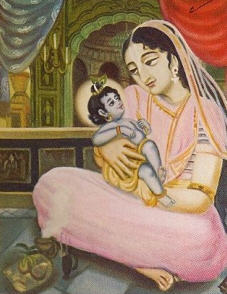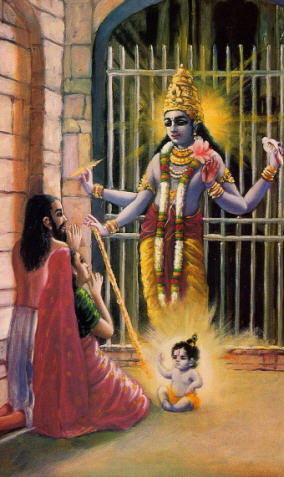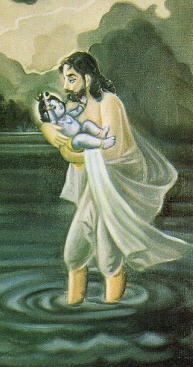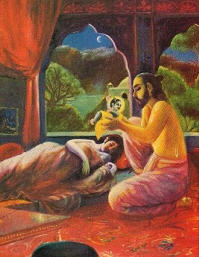Adapted from KRSNA,
the Supreme Personality of Godhead,
by His Divine Grace A.C. Bhaktivedanta Swami Prabhupada.

Five thousand years ago, the people of the earth were suffering under many demoniac rulers, especially the wicked king Kamsa. At last the rulers became so oppressive that Lord Brahma, the chief of the universal demigods, appealed to the Supreme Lord, Visnu [Krsna], for help. As Lord Brahma sat in meditation, Lord Visnu transmitted a message to him which Lord Brahma then relayed to the other demigods: "Very soon Lord Visnu, the Supreme Personality of Godhead, will appear on earth along with His supreme potencies. All of you demigods should immediately take birth in families of the Yadu dynasty. When, in due course of time, the Lord Himself appears in the Yadu dynasty, you should assist Him in His mission of annihilating the demons and establishing the devotees."
Some time later, a great wedding took place in what is now known as India. King Devaka gave his daughter, Devaki, to Vasudeva in marriage. Vasudeva was the son of King Surasena, the leader of the Yadu dynasty, in which Lord Krsna was to appear. Being very affectionate toward his daughter, King Devaka gave a magnificent dowry to his new son-in-law: four hundred elephants decorated with golden garlands, fifteen thousand decorated horses, and eighteen hundred chariots. Following an ancient Indian custom, Devaki's brother Kamsa voluntarily took the reins of the chariot and drove the bride and bridegroom to their new home. As they drove in the chariot along the road to Mathura, Vasudeva's home and the Yadus' capital city, musicians played melodiously on conchshells, bugles, drums, and kettledrums.
The procession was passing very pleasingly when a voice suddenly vibrated from the sky: "Kamsa! You are such a fool! You are driving the chariot of your sister and your brother-in-law, but you do not know that their eighth child will kill you!"
Kamsa immediately caught hold of Devaki's hair and drew his sword to kill her. But before he could strike her Vasudeva interjected, "My dear brother-in-law! You are the most famous king of the Bhoja dynasty. And everyone knows that you are the greatest of warriors."
Though shocked at Kamsa's behavior, Vasudeva was able to stay the sword of Kamsa with this flattery. Vasudeva continued, "Are you so infuriated that you are prepared to kill a woman—indeed, your own sister—just at the auspicious time of her marriage?" Kamsa was well known as the most demoniac of all the kings in the Bhoja dynasty. In fact, he was one of the demons whom Lord Visnu intended to annihilate. Nonetheless, Vasudeva was aghast that Kamsa could kill his own sister.
As Kamsa reflected for a moment, Vasudeva spoke on a more philosophical plane. "Why should you be so afraid of death? Death is born along with you right at the moment of your birth. From the very day you took your birth, you began to die. And when you die, your present body will stop functioning; you will take another body. Therefore, I beg you not to be overwhelmed by the fear of death, nor to bear malice toward your sister. You are safe for the present. Also, Devaki and I might not even have sons in the future. And if we do have sons, I promise that I shall present all of them to you for the necessary action."
Kamsa knew the value of Vasudeva's word of honor, and he was convinced by his argument. So he desisted from the heinous attempt to kill Devaki. Greatly pleased, Vasudeva praised Kamsa's decision, and the party continued to Mathura.

In due course of time, when Devaki bore a son, Vasudeva kept his word and brought the child to Kamsa. Vasudeva felt great anguish when he handed over the newborn child, and Kamsa took pity on his brother-in-law. "My dear Vasudeva, you need not present this child to me. I am not in danger from this child. The voice said that the eighth child would kill me. Why should I harm this child unnecessarily? You can take him back."
However, at that time the great sage Narada came to talk with Kamsa. Being very anxious to accelerate the descent of Lord Krsna, Narada informed Kamsa that in Mathura the members of the Yadu dynasty were preparing for the advent of Lord Visnu. Demigods were taking birth as Yadus, and in the village of Gokula, just across the Yamuna River, the cowherd families headed by King Nanda were also getting ready for the Lord's appearance. Narada warned Kamsa to be on his guard.
Kamsa now understood that it was Lord Visnu who would kill him, and that the Lord was coming soon. So he at once arrested Vasudeva and Devaki and put them behind prison bars.
Within the prison, shackled in iron chains, Vasudeva and Devaki gave birth to sons year after year; and, thinking each baby to be the incarnation of Visnu, Kamsa murdered them, one after another. Then he captured and imprisoned his own father, Ugrasena, who was the leading king of the land. Thereupon, Kamsa declared himself the leading king, and after making alliances with many other demoniac rulers, he did indeed become the most powerful king in all of India.
During the years when Kamsa murdered the first six babies of Devaki and Vasudeva, many of Kamsa's friends and relatives approached him and begged him to stop his atrocities. But instead of complying, by the force of his personality Kamsa moved these supplicants to bow down and worship him.
Then, when Devaki became pregnant for the seventh time, a plenary expansion of Lord Krsna known as Ananta appeared within her womb. Devaki was overwhelmed with both jubilation and lamentation. She was happy that the Lord had taken shelter in her womb, but at the same time she was afraid that as soon as she gave birth, Kamsa would kill the child.
At that time Krsna, the Supreme Personality of Godhead, ordered His internal potency (Yogamaya) to descend to the earth. Yogamaya cast a spell over Devaki and another wife of Vasudeva's, Rohini, who was across the Yamuna River living with King Nanda and Queen Yasoda in the village of Gokula. Frightened away by Kamsa's atrocities, Rohini and many others from the Yadu dynasty were living outside Mathura.
When Yogamaya had cast her influence over Devaki and Rohini, Lord Krsna transferred His primary expansion from Devaki's womb to Rohini's womb. Thus, people thought that Devaki's seventh pregnancy was a miscarriage. But actually the baby, a boy, was born to Rohini in Gokula. He was to be known as Balarama, the brother and constant companion of Lord Krsna.
Now the time had arrived for the birth of the fateful eighth child of Vasudeva and Devaki. From the spiritual world, Lord Krsna entered by His mystic power into the heart of Vasudeva, who thus appeared just like the glowing sun. Then Lord Krsna passed from the heart of Vasudeva into the heart of Devaki, exactly as the setting sun's rays transfer to the full moon rising in the east. The Lord did not appear within Devaki by seminal discharge; rather. He appeared independently, by His own energy.

In this way, Devaki became the residence of the Supreme Personality of Godhead, who is one without a second and the cause of all creation. Because she was within the prison walls of Kamsa's palace, no one but Kamsa could see her transcendental beauty, which appeared like fire contained within a pot. When Kamsa saw his sister's extraordinary beauty, he at once understood that God had indeed taken shelter in her womb, and he became distraught. At first he decided to kill Devaki, but then he changed his mind, fearing public outrage at the murder of a pregnant woman.
As the days went by, an ocean of animosity against the Lord swelled in Kamsa's heart. He patiently awaited the child's birth, expecting to kill him as he had killed Devaki's other sons. He was obsessed with the thought of Krsna twenty-four hours a day. While sleeping, eating, working, sitting, or walking, all he could see around him was Krsna.
As the time drew near for the appearance of the Lord, auspicious constellations and stars moved to influential positions in the heavens. In all directions, peace and prosperity spread over the earth. Rivers flowed full of water, and lakes were decorated beautifully with lotus flowers. Peacocks and other beautiful birds in the forest danced with their consorts and sang with sweet voices. The wind blew pleasantly, carrying the aroma of many flowers, and the sensation of bodily touch was very pleasing. At the seashore, the mild sound of lapping waves mingled with the gentle thunder of the clouds above. On the heavenly planets, angels and their wives danced, Gandharvas and Kinnaras sang, and the Caranas offered prayers to the Personality of Godhead. The great sages and demigods showered flowers down upon the earth.
Then, in the darkness of night, as a thunderstorm brought heavy rains to Mathura, the Lord appeared before Vasudeva and Devaki within the jail of Kamsa. Vasudeva was struck with wonder when he saw the newborn child. The baby had four arms, and He held a conchshell, a club, a disc, and a lotus flower in His hands. He was decorated with the special mark of Srivatsa on His chest, and around His throat hung the jeweled necklace of kaustubha stone. He was dressed in yellow silk, and he wore valuable bracelets, earrings, and other ornaments all over His body. On His head, which was abundantly covered with hair. He wore a helmet bedecked with a vaidurya stone. Shedding His effulgence within the room, the child appeared as dazzling as a bright, blackish cloud.
Convinced that the newborn child was the Supreme Personality of Godhead, Vasudeva bowed down with folded hands and began to offer Him prayers: "My dear Lord, I can understand who You are. You are the Supreme Personality of Godhead, the Supersoul of all living entities and the Absolute Truth. I can understand that You have appeared before us in Your own eternal form just to deliver us from our fear of Kamsa. You have appeared to kill the uncivilized Kamsa and his followers. But, knowing that You were coming to kill him, he has already murdered six of Your elder brothers, and now he is simply awaiting the news of Your birth. As soon as he hears of it, he will immediately come here with all kinds of weapons to kill You."
Then Devaki offered her prayers. "My dear Lord, all Your eternal forms in Your millions of incarnations are original forms, because They are outside the material world and existed before the creation of this cosmos. They are eternal, all-pervading, self-effulgent, changeless, and uncontaminated by material qualities. Your eternal forms are ever-cognizant and situated in transcendental goodness, and They always perform blissful pastimes. They are also self-sufficient, and 1 can thus understand that You are the Supreme Lord.
"But I am afraid for You because of my brother Kamsa. My Lord, Kamsa may already know that You are born. Therefore, I request You to conceal Your four-armed form holding the conchshell, disc, club, and lotus flower."
On hearing their prayers, the Lord replied, "I have appeared in this Visnu form just to convince you that I am the Supreme Personality of Godhead. I could have appeared as an ordinary child, but then you wouldn't have believed that I am the Supreme Lord. My dear mother and father, you have accepted Me as your child with great affection, and I am very pleased with you. You shall go back to home, back to Godhead, because you have perfected your mission. Now I order you to take Me immediately to Gokula and exchange Me for the daughter who has just been born to Yasoda." Having spoken thus, the Lord transformed Himself into an ordinary child and remained silent.

Exactly at that time, a daughter was born to King Nanda and Queen Yasoda, in Gokula. She was Yogamaya, who had previously cast her spell so that Balarama could transfer to the womb of Rohini. Now, even as she lay as a newborn baby beside Yasoda in Gokula, she spread her influence to Mathura. All the people in Kamsa's palace, including the doorkeepers, fell asleep. And the palace doors automatically opened, although they had been barred and shackled with iron chains. When the door of the jail opened, Vasudeva lifted up baby Krsna and walked outside. Severe rain was falling and the night was very dark, but by Krsna's influence Vasudeva could see as clearly as if the sun were shining. The plenary expansion of Krsna known as Lord Ananta appeared in the shape of a serpent, and He spread His hoods over Vasudeva's head to protect him from the downpour.
On arriving at the bank of the Yamuna, Vasudeva saw that the river was roaring with waves and that the whole span was full of foam. Still, in that furious feature, the river gave passage to Vasudeva, just as the Indian Ocean once made a path for Lord Rama when he was bridging the gulf to Lanka.
On the other side, Vasudeva went to the house of Nanda in Gokula. All the cowherd men were fast asleep, and Vasudeva took the opportunity to slip into Yasoda's room. Without difficulty he exchanged the two babies. Then he returned to Mathura, went back into the prison, and silently placed the girl on the lap of Devaki. So that Kamsa would not know that anything had happened, Vasudeva then adjusted all the doors and gates and again clamped the shackles on himself.
The gatekeepers awoke to the newborn child's crying and rushed into Kamsa's bedroom to tell him the news. Kamsa jumped out of bed and exclaimed, "Now the cruel death of my life is born!" So perplexed that his hair stood on end, Kamsa proceeded to the jail.
On seeing her brother approaching, Devaki prayed to him meekly, "My dear brother, please do not kill this female child. I promise she will be your son's wife. Don't kill her. You are not to be killed by a girl. That was not the omen. You are to be killed by a male child. So please, do not kill her. My dear brother, even though you have killed so many of my newborn children, that was not your fault. You were advised by demoniac friends. But now I beg you to excuse this girl. Let her live as my daughter."
However, Kamsa was so cruel that he did not listen to the beautiful prayers of his sister. He forcibly grabbed the newborn child, raised her over his head, and attempted to dash her mercilessly on the stone floor. But the child slipped from his hands and flew up into the sky! Hovering there, she revealed herself as the goddess Durga, decorated with a fine dress, flower garlands, and ornaments. In her eight hands she held a bow, a lancet, arrows, a bell, a conchshell, a disc, a club, and a shield. Demigods prayed to her and offered her gifts. She looked down at Kamsa and addressed him, "You rascal, how can you kill me? The child who will one day kill you has already been born, and is elsewhere. Don't be so cruel to your poor sister." Then Durga departed.
Overwhelmed with fear after hearing Durga's words, Kamsa released Vasudeva and Devaki from their shackles. Addressing them politely, he said, "My dear sister and brother-in-law, completely neglecting our intimate relationship, I have acted just like a demon in killing my own nephews. I don't know what will be the results of these acts of mine. Probably I shall be sent to the hell where brahmana-killers go.
"My dear sister Devaki, you are so gentle and kind. Please forgive me. Don't be aggrieved by your children's death, which I have caused. Actually, they were not killed by me at all. Their death was predestined. Everyone has to act according to destiny, even unwillingly. Please forgive the atrocities I have committed against you. I am very poor-hearted, and you are so greathearted, so take compassion on me and forgive me." With tears flowing from his eyes, Kamsa fell down at their feet.
When Devaki saw her brother's repentance, she was pacified and forgave all his atrocious activities. Vasudeva also forgave all past incidents and, smiling, addressed Kamsa, "My dear fortunate brother-in-law, every living entity is born ignorant, thinking that this material body is his self. And on the basis of this ignorant conception, we create enmity and friendship. Lamentation, jubilation, tearfulness, envy, greed, illusion, and madness are different features of our material concept of life. When these things influence us, we engage in acts inimical to others and forget our eternal relationship with the Supreme Personality of Godhead."
When Vasudeva spoke to Kamsa in such an illuminating way, Kamsa became very pleased, and his guilt for killing his nephews subsided. With the permission of his sister and brother-in-law, he then returned home in great relief.
Meanwhile, across the river in Gokula, Yasoda was fast asleep. Because she was exhausted by the labor of childbirth, she could not remember whether she had given birth to a boy or a girl.
The next day, King Nanda declared that Yasoda had given birth to a male child, and Nanda celebrated the birth of his son very joyfully. He called for learned astrologers and brahmanas to perform the birth ceremony according to Vedic custom. Wearing fine dress, ornaments, and garlands, Nanda and his relatives sat down in front of what they thought was Krsna's birthplace. The brahmanas then chanted auspicious mantras, and astrologers read a horoscope of the child's future. Everyone worshiped Lord Visnu and the demigods and also the forefathers of the family. Finally, King Nanda distributed to the brahmanas both hills of grain and 200,000 well-ornamented cows.
As Nanda worshiped Lord Visnu, he desired only that his newborn child would be happy. He prayed to Visnu to protect the child, not knowing that his son Krsna was Himself the Supreme Personality of Godhead, the origin of Visnu and the origin of all material and spiritual worlds. In this way, Lord Krsna began His earthly pastimes, in which He would annihilate the demons and deliver His devotees back to His own abode, Goloka Vrndavana.
